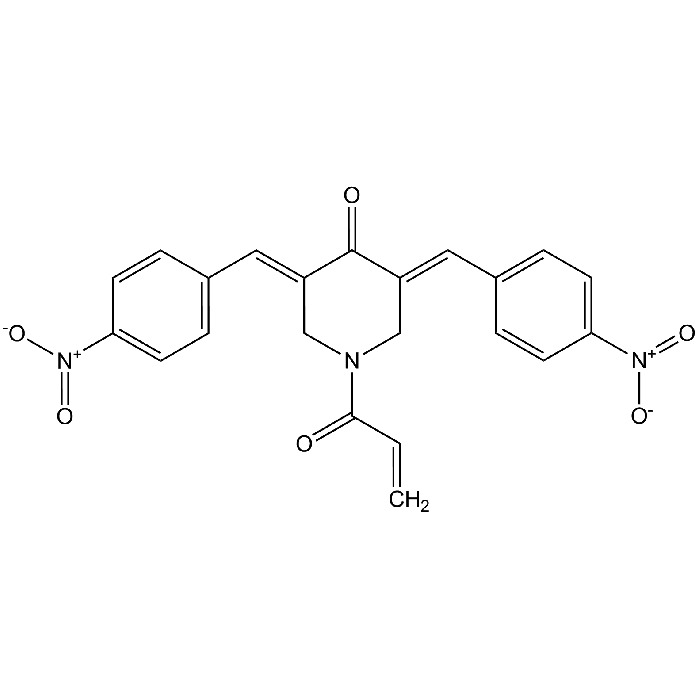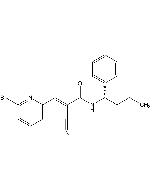Cookie Policy: This site uses cookies to improve your experience. You can find out more about our use of cookies in our Privacy Policy. By continuing to browse this site you agree to our use of cookies.
AdipoGen Life Sciences
b-AP15
As low as
50
CHF
CHF 50.00
In stock
Only %1 left
AG-CR1-3552-M0011 mgCHF 50.00
AG-CR1-3552-M0055 mgCHF 110.00

| Product Details | |
|---|---|
| Synonyms | NSC 687852; 3E,5E-bis[(4-Nitrophenyl)methylene]-1-(1-oxo-2-propen-1-yl)-4-piperidinone |
| Product Type | Chemical |
| Properties | |
| Formula |
C22H17N3O6 |
| MW | 419.4 |
| CAS | 1009817-63-3 |
| Purity Chemicals | ≥98% |
| Appearance | Off-white to yellow solid. |
| Solubility | Soluble in DMSO (20mg/ml). |
| InChi Key | GFARQYQBWJLZMW-JYFOCSDGSA-N |
| Smiles | O=C(N(C/C1=C\C2=CC=C(C=C2)[N+]([O-])=O)C/C(C1=O)=C\C3=CC=C(C=C3)[N+]([O-])=O)C=C |
| Shipping and Handling | |
| Shipping | AMBIENT |
| Short Term Storage | +4°C |
| Long Term Storage | -20°C |
| Handling Advice | Protect from light. |
| Use/Stability | Stable for at least 2 years after receipt when stored at -20°C. |
| Documents | |
| MSDS |
 Download PDF Download PDF |
| Product Specification Sheet | |
| Datasheet |
 Download PDF Download PDF |
Description
- b-AP15 is a specific deubiquitinase (DUB) inhibitor. It inhibits ubiquitin-specific-processing protease 14 (USP14) and ubiquitin c-terminal hydrolase isozyme L5 (UCHL5; UCH37), two 19S regulatory particle proteasome-associated DUBs. It exhibits minimal inhibition of UCHL-1, UCHL-3, USP2, USP7, USP and BAP1. Has been described to inhibit also the 20S proteasome with an IC50 comparable to that required for inhibiting the 19S regulatory particles.
- b-AP15 has anticancer properties and blocks tumor progression in vivo in mice and prevents organ infiltration in mouse models of myeloid leukemia. b-AP15 also renders tumor cells sensitive to TNF-mediated apoptosis by natural killer and T cells. It induces apoptosis, ER stress and autophagy in several cancer cells.
- b-AP15 has anti-inflammatory properties inhibiting ERK1/2 and JNK phosphorylation, increasing IκBα levels and inhibiting NF-κB p65.
- b-AP15 inhibits the LPS/ATP-induced deubiquitination of NLRP3 and further increases NLRP3 ubiquitination. This leads to inhibition of NLRP3 activation, indicating that deubiquitination of NLRP3 by the priming and activation signals is critical for its activation.
Product References
- Induction of the lysosomal apoptosis pathway by inhibitors of the ubiquitin-proteasome system: M. Berndtsson, et al.; Int. J. Cancer 124, 1463 (2009)
- Inhibition of proteasome deubiquitinating activity as a new cancer therapy: P. D'Arcy, et al.; Nat. Med. 17, 1636 (2011)
- A novel inhibitor of proteasome deubiquitinating activity renders tumor cells sensitive to TRAIL-mediated apoptosis by natural killer cells and T cells: D. Sarhan, et al.; Cancer Immunol. Immunother. 62, 1359 (2013)
- Deubiquitinases Regulate the Activity of Caspase-1 and Interleukin-1β Secretion via Assembly of the Inflammasome: G. Lopez-Castejon, et al.; J. Biol. Chem. Immunol. 288, 2721 (2013)
- Proapoptotic effects of the novel proteasome inhibitor b-AP15 on multiple myeloma cells and natural killer cells: X. Feng, et al.; Exp. Hematol. 42, 172 (2014)
- Inhibitory effect of b-AP15 on the 20S proteasome: L. Huang, et al.; Biomolecules 4, 931 (2014)
- Oxidative Stress Induced by the Deubiquitinase Inhibitor b-AP15 Is Associated with Mitochondrial Impairment: X. Zhang, et al.; Oxid. Med. Cell Longev. 2019, 1659468 (2019)
- Deubiquitinase Inhibitor b-AP15 Attenuated LPS-Induced Inflammation via Inhibiting ERK1/2, JNK, and NF-Kappa B: F. Zhang, et al.; Front. Mol. Biosci. 7, 49 (2020)






